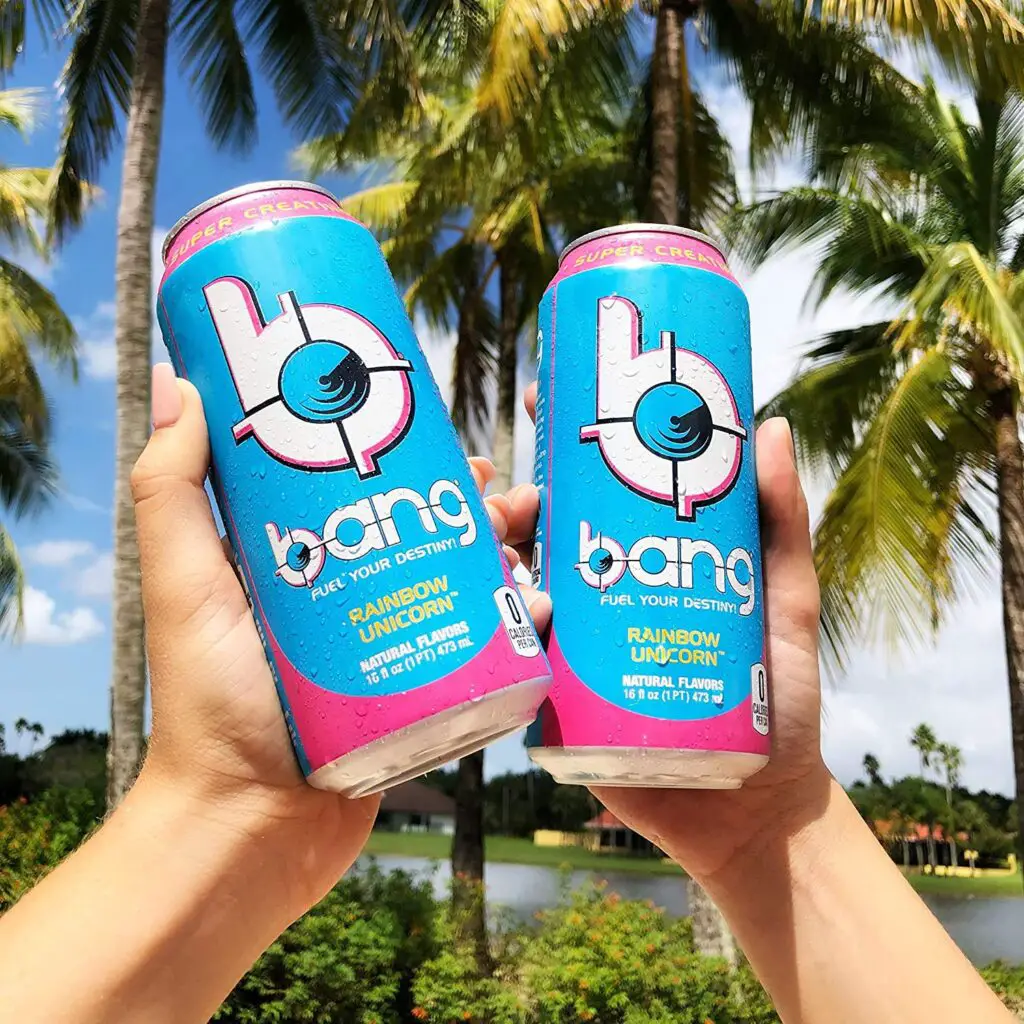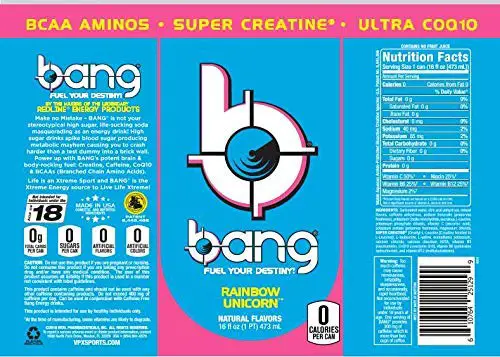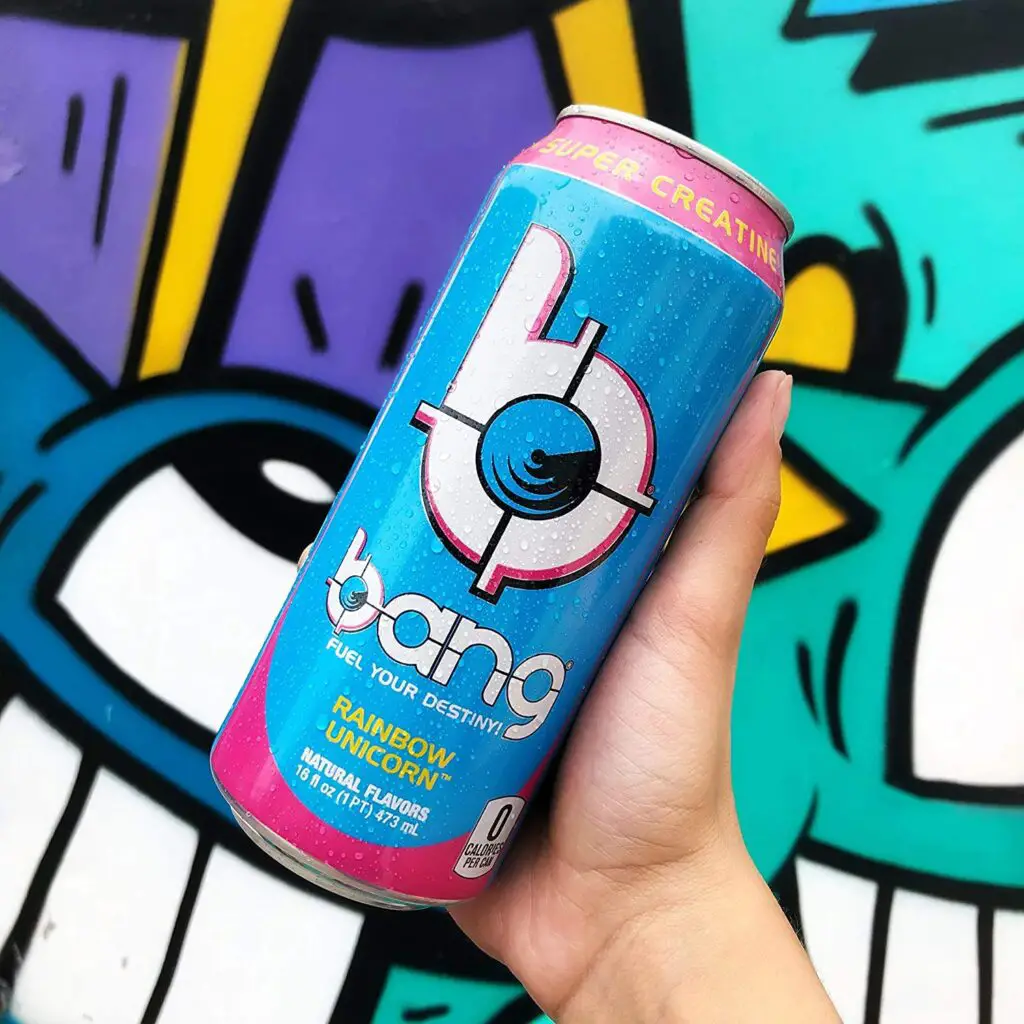Energy drinks have gained immense popularity in recent years, and one brand that has stood out is Bang Energy. With its wide range of flavors and appealing packaging, Bang Energy has captured the attention of many health-conscious individuals. However, concerns have been raised about the potential health effects of consuming these drinks. In this article, we will explore the popularity of Bang Energy Drinks and discuss the answer to Is Bang Bad For You?
The Popularity Of Bang Energy Drinks

Bang Energy Drinks were first introduced in 2012 and have quickly become one of the best-selling energy drinks in the United States. The brand offers over 40 flavors, ranging from classics like Blue Raspberry to unique options like Cotton Candy. The drinks are marketed to stay alert, improve mental focus, increase energy levels, and reduce fatigue. Bang Energy Drinks contain caffeine, taurine, and B vitamins, with no added sugar and low calories.
The brand has gained a loyal following, particularly among athletes and fitness enthusiasts who see it as a convenient and effective way to boost energy levels before or during exercise. Bang Energy Drinks are widely available for purchase online and in stores nationwide. However, it is important to note that the FDA has not evaluated the safety and effectiveness of these drinks.
Concerns About The Health Effects
So, is Bang bad for you? While Bang Energy Drinks can provide a temporary energy boost due to their high caffeine content, concerns exist about their overall health effects. Some of the main concerns include:
- High caffeine content: Bang Energy Drinks contain 300mg of caffeine per serving, equivalent to approximately three cups of coffee. Excessive caffeine consumption can lead to side effects such as increased heart rate, high blood pressure, insomnia, and headaches.
- Additives and artificial sweeteners: Bang Energy Drinks contain additives such as artificial flavors and sweeteners like acesulfame potassium and sucralose. These ingredients have been linked to potential health risks, including insulin resistance and inflammatory reactions.
- Lack of long-term studies: There is a lack of long-term studies on the health effects of Bang Energy Drinks. While some studies have shown the potential benefits of caffeine in improving endurance and cognitive performance, the overall safety and effectiveness of these drinks remain uncertain.
It is always important to consult with a healthcare professional before incorporating new dietary supplements or energy drinks into your routine to ensure they suit your health needs.
Ingredients In Bang Energy Drinks

When determining ‘Is Bang Bad For You?’, examining the ingredients used in the drink’s formulation is crucial. Understanding the effects of these ingredients on your body can help you make an informed decision. Here are some key ingredients found in Bang Energy Drinks:
Caffeine Content And Its Effects
Caffeine is the primary active ingredient in Bang Energy Drinks, and each can contain a high dose of 300 milligrams (mg). This is equivalent to around 3 cups of coffee. Caffeine is a well-studied substance known to enhance both physical and mental energy. It can increase alertness, reduce fatigue, and improve athletic performance. However, it’s important to be mindful of caffeine intake, as excessive consumption can lead to nervousness, irritability, and sleeplessness.
Artificial Sweeteners Like Sucralose
Bang Energy Drinks contain artificial sweeteners like sucralose, which provide a sweet taste without adding calories. Sucralose is considered safe for consumption, but some studies suggest it may negatively affect insulin sensitivity in certain individuals. It’s important to note that different people may have varying responses to artificial sweeteners, so it’s best to monitor your body’s reaction.
Preservatives And Their Potential Impact
Bang Energy Drinks also contain preservatives like potassium sorbate and sodium benzoate. While these preservatives are generally recognized as safe by regulatory authorities, studies have shown that they can alter gene expression and activate inflammatory pathways in some individuals. It’s advisable to moderate your intake of preservatives and prioritize whole, unprocessed foods whenever possible.
To get a more comprehensive understanding of the ingredients in Bang Energy Drinks, it’s always beneficial to consult reliable sources such as scientific studies or a healthcare professional. Additionally, listening to your body’s unique responses and reactions can help determine whether Bang Energy Drinks suits you.
Creatine In Bang Energy Drinks

| Ingredient | Effects/Considerations |
|---|---|
| Caffeine | – Primary active ingredient, provides an energy boost, can increase alertness, excessive consumption may cause side effects |
| Artificial sweeteners | – Sucralose used as a sweetener, provides a sweet taste without calories and may affect insulin sensitivity in some individuals |
| Preservatives | – Potassium sorbate and sodium benzoate used, generally recognized as safe, may activate inflammatory pathways in some |
| Creatine | – Naturally occurring compound, enhances muscle strength and power, increases muscle mass, improves exercise performance |
Benefits Of Creatine For Performance
Creatine is a popular ingredient in many sports supplements and energy drinks, including Bang Energy drinks. It is a naturally occurring compound found in our muscles and is vital in providing energy during high-intensity exercise. Here are some potential benefits of creatine for performance:
- Improved strength and power: Creatine supplementation has enhanced muscle strength and power, allowing athletes to perform better during intense workouts or competitions.
- Increased muscle mass: Creatine can increase muscle protein synthesis, leading to gains in muscle mass over time.
- Enhanced exercise performance: Creatine has been found to improve performance in activities that require short, intense bursts of energy, such as sprinting or weightlifting.
Recommended Dosage And Potential Risks
The recommended creatine dosage varies depending on an individual’s weight and specific goals. However, a typical loading phase may involve taking around 20 grams of creatine daily for 5-7 days, followed by a 2-5 grams maintenance dose.
While creatine is generally considered safe and well-tolerated, there are some potential risks to be aware of:
- Gastrointestinal distress: High doses of creatine may cause digestive issues such as bloating, diarrhea, or stomach cramps. It is important to start with a lower dose and gradually increase to avoid these side effects.
- Dehydration: Creatine can cause an increase in water retention within the muscle cells, which may lead to dehydration if adequate hydration is not maintained.
- Kidney and liver function: Limited evidence suggests long-term, high-dose creatine supplementation may adversely affect kidney and liver function. However, more research is needed to understand these risks fully.
It is always recommended to consult with a healthcare professional or sports nutritionist before starting any new supplement regimen, including creatine. They can provide personalized guidance based on your specific needs and goals.
For more information on creatine, you can visit Wikipedia.
Other Additives And Their Effects
Super Creatine And L-leucine
Super creatine, a compound in Bang energy drinks, consists of creatine bonded to L-Leucine. This combination is believed to increase mental focus, but there is limited scientific research on its effectiveness. Although creatine is a naturally occurring substance in the body that can improve physical performance, the company does not disclose the amount of creatine and L-Leucine in Bang energy drinks. The safe dose of creatine is up to 5 grams per day, and it is unlikely that the amount in Bang energy drinks would significantly affect it.
Coenzyme Q10 For Energy Production
Coenzyme Q10 (CoQ10) is a naturally occurring compound in the body that plays a crucial role in energy production. It is found in the highest concentrations in tissues with high energy turnover, such as the heart, brain, liver, and kidney. Coenzyme Q10 is also available in supplement form and is sometimes included in energy drinks.
Although coenzyme Q10 is essential for proper energy metabolism, its effectiveness in energy drinks is uncertain. Research on the benefits of coenzyme Q10 supplementation for increased energy production is inconsistent. Some studies suggest potential benefits, while others do not significantly improve energy levels.
It is important to note that the effectiveness of any ingredient, including coenzyme Q10, can vary depending on the individual and the specific formulation of the energy drink. If you are considering using energy drinks for increased energy, it is recommended to consult with a healthcare professional to determine the most suitable option for your needs.
For more information on coenzyme Q10, refer to the Wikipedia page for a detailed overview of its functions and potential benefits.
While super creatine and coenzyme Q10 may be included in energy drinks, their exact effects on energy levels and performance are still being researched. It is always important to consume these drinks in moderation and prioritize a balanced diet and healthy lifestyle for sustained energy and well-being.
Comparing Bang Energy Drinks To Other Options
To understand more about the question ‘Is Bang Bad For You?’, you should also learn about comparing this drink and other choices.
Caffeine Content In Comparison To Other Beverages
When comparing Bang Energy Drinks to other popular beverages, the caffeine content is a crucial factor to consider. Here is a comparison of the caffeine content in Bang Energy Drinks and other common beverages:
- Bang Energy Drink: One 16-ounce can of Bang contains 300 mg of caffeine, equivalent to about three cups of coffee. This high caffeine content makes Bang Energy Drinks a potent energy booster.
- Red Bull: One 8.4-ounce can of Red Bull contains 80 mg of caffeine. Compared to Bang Energy Drinks, Red Bull has a significantly lower caffeine content.
- Coffee: An 8-ounce cup of brewed coffee contains about 95 mg of caffeine. While Bang Energy Drinks have a higher caffeine content than a single cup of coffee, it’s important to note that the serving size of Bang is typically larger.
- Tea: The caffeine content in tea varies depending on the type and preparation. On average, a cup of black tea contains about 47 mg of caffeine, while green tea typically contains around 28 mg.
- Soda: Many popular sodas, such as Coca-Cola or Pepsi, contain caffeine, but in much smaller amounts compared to energy drinks and coffee. A 12-ounce can of cola contains approximately 34 mg of caffeine.
Healthier Alternatives For An Energy Boost
While Bang Energy Drinks can provide a quick energy boost, it’s essential to consider healthier alternatives for sustained energy and overall well-being. Here are some healthier options to consider:
- Water: Staying hydrated is crucial for maintaining energy levels throughout the day. Drinking enough water can help prevent dehydration, which can cause fatigue.
- Herbal Tea: Herbal teas, such as chamomile or peppermint, can provide a natural energy boost without the high caffeine content. These teas are also known for their relaxing properties.
- Green Smoothies: Blending fruits and leafy greens into a smoothie can boost nutrient-packed energy. Green smoothies are rich in vitamins, minerals, and antioxidants, which can support overall energy and vitality.
- Natural Energy Supplements: Various natural energy-boosting supplements, such as ginseng or ginkgo biloba, are available. These supplements are known for their ability to enhance focus and energy levels.
- Balanced Meals: Eating a balanced diet with lean proteins, whole grains, fruits, and vegetables can provide sustained energy throughout the day. Avoiding processed foods high in sugar and unhealthy fats can help maintain stable energy levels.
While Bang Energy Drinks can provide a quick energy boost, it’s important to consume them in moderation and consider healthier alternatives for long-term energy and well-being.
Potential Risks And Considerations
While Bang Energy Drink can provide a quick energy boost, it’s important to be aware of the potential risks and considerations associated with its consumption. Here are a few key points to keep in mind:
High Caffeine And Sugar Content
One of the main concerns with Bang Energy Drink is its high caffeine content. With 300mg of caffeine per 16 fl oz can, Bang contains more than other popular energy drinks. While caffeine can enhance alertness and improve performance, excessive consumption can lead to jitteriness, anxiety, and other negative side effects.
Furthermore, Bang Energy Drink is sugar-free, which may appeal to some individuals. However, it’s important to note that artificial sweeteners, such as the sucralose found in Bang, may have potential health risks, including an increased risk of cancer, changes in gut bacteria, and weight gain. It’s essential to moderate your intake of artificial sweeteners and pay attention to your overall sugar consumption.
Effects On Cardiovascular Health And Dehydration
Combining high caffeine and other stimulants in Bang Energy Drink can increase heart rate and blood pressure. This may pose a risk to individuals with underlying heart conditions or those sensitive to caffeine. It’s crucial to consult with a healthcare professional if you have any pre-existing cardiovascular conditions or concerns.
Moreover, excessive consumption of energy drinks like Bang can contribute to dehydration. While the caffeine in Bang may provide a temporary energy boost, it can also act as a diuretic, increasing urine production and potential fluid loss. Staying hydrated is vital by drinking water alongside or instead of energy drinks, especially during prolonged physical activity or in hot environments.
It’s essential to consider these potential risks and consult with a healthcare professional before incorporating Bang Energy Drink into your routine. Remember, moderation is key, and it’s important to prioritize a well-balanced diet, proper hydration, and a healthy lifestyle overall.
The Role Of Moderation And Hydration
While the debate over the health effects of Bang energy drinks continues, it’s important to emphasize the role of moderation and hydration when consuming any caffeinated beverages. Here are some tips for responsible consumption:
Tips For Responsible Consumption
- Limit your intake: Even though Bang energy drinks may offer benefits such as increased energy and focus, consuming them in moderation is important. Limiting yourself to one can per day is recommended to avoid excessive caffeine intake.
- Stay hydrated: Caffeinated beverages like Bang can have a diuretic effect and may contribute to dehydration. To counteract this, drink plenty of water throughout the day to maintain proper hydration levels.
- Avoid mixing with other caffeinated products: It’s advisable to avoid consuming Bang energy drinks in combination with other caffeinated products such as coffee or tea. Excessive caffeine consumption can lead to negative side effects like anxiety, jitteriness, and disrupted sleep patterns.
- Keep track of your caffeine intake: It’s a good idea to know your overall caffeine consumption from all sources, including energy drinks, coffee, tea, and chocolate. It can help you maintain a healthy balance and avoid exceeding recommended daily limits.
Importance Of Maintaining A Balanced Lifestyle
While energy drinks like Bang can provide a quick boost of energy, it’s important to remember that they should not replace a well-rounded and healthy lifestyle. Here are some essential factors to consider:
- Sleep: Adequate sleep is crucial for overall health and well-being. No amount of energy drinks can substitute for a good night’s sleep. Aim for 7-9 hours of quality sleep each night.
- Nutrition: Focus on consuming a balanced diet that includes a variety of fruits, vegetables, whole grains, lean proteins, and healthy fats. Nutrient-dense foods provide essential vitamins and minerals that support overall health and energy levels.
- Exercise: Regular physical activity is essential for optimal health and energy levels. Engage in activities you enjoy, whether jogging, swimming, or yoga.
- Stress management: Find healthy ways to manage stress, such as practicing mindfulness, engaging in hobbies, or spending time with loved ones.
By practicing moderation, staying hydrated, and maintaining a balanced lifestyle, you can make informed choices about energy drink consumption and prioritize your overall well-being.
Data:
- Energy drinks are aggressively marketed with the claim that these products give an energy boost to improve physical and cognitive performance.
- Consumption of energy drinks has been increasing dramatically in the last two decades, particularly amongst adolescents and young adults.
- Several adverse health effects have been related to energy drink consumption.
FAQ about Is Bang Energy bad for you?
Q: What is Bang Energy?
A: Bang Energy is a popular energy drink brand known for its high caffeine content and various flavors. It is often used as a pre-workout drink or as an alternative to coffee.
Q: Does Bang Energy have any negative side effects?
A: Yes, Bang Energy can cause several side effects due to its high caffeine content and other ingredients. Some potential side effects include heart problems, dizziness, rapid heart rate, and insomnia. It is important to control your daily consumption of Bang Energy as its caffeine content is close to the recommended FDA daily limit.
Q: How many calories are in Bang Energy?
A: A 16 fl. oz can of Bang Energy is completely calorie-free. This makes it a healthier option compared to other energy drink brands that contain a high number of calories.
Q: How much caffeine does Bang Energy contain?
A: A 16 fl. oz can of Bang Energy contains 300mg of caffeine, which is a high amount for an energy drink of its size. However, caffeine tolerance varies from person to person, so it’s important to be aware of your own tolerance and limit your consumption accordingly. The FDA recommends a maximum daily caffeine intake of up to 400mg for healthy adults.
Q: Does Bang Energy contain sugar?
A: No, Bang Energy is completely sugar-free. It uses artificial sweeteners, such as sucralose, to enhance the flavor and sweetness of the drink.
Q: Is Bang Energy bad for your heart?
A: Bang Energy can be bad for your heart, especially if you have any pre-existing heart conditions. The high caffeine content in Bang Energy can increase heart rate and blood pressure, potentially leading to abnormal heart rhythm and other severe heart problems. It’s best to moderate your consumption and be mindful of your overall caffeine intake.
Q: Is Bang Energy bad for your kidneys?
A: Regular consumption of Bang Energy can be bad for your kidneys. The high caffeine content can cause frequent urination, leading to dehydration if you don’t drink enough water. Over time, excessive caffeine consumption can put a strain on your kidneys. Modifying your intake and staying hydrated by drinking water and energy drinks is important.
Q: What does Bang Energy do to your brain?
A: Bang Energy contains ingredients like BCAAs and CoQ10, which in theory, can help with brain function. However, the amounts of these ingredients in Bang Energy might not be enough to provide significant benefits. While Bang Energy can provide an energy boost, the full benefits for brain function are still unclear.
Q: Can you drink Bang Energy every day?
A: It is not recommended to drink Bang Energy every day. Consuming excessive amounts of caffeine, especially if you are caffeine-sensitive, can lead to side effects like insomnia, anxiety, and headaches. Regular consumption of Bang Energy can also lead to dependence. Limiting your consumption and considering other, less caffeinated energy drink options is best.
Q: Are there any healthier alternatives to Bang Energy?
A: If you’re looking for a healthier alternative to Bang Energy, there are several options available. Some alternatives include powdered energy drinks like REIZE, which offer customization and convenience and are lower in caffeine content. It’s always a good idea to read ingredient labels and choose energy drinks with minimal additives and ingredients that align with your health goals.
Conclusion
Now you should know the answer to ‘Is Bang Bad For You?’. After analyzing the ingredients and considering the available research, it is important to make an overall assessment of Bang Energy Drinks:
- Caffeine: Bang Energy Drinks contain a significant amount of caffeine, which can provide a temporary energy boost. However, excessive caffeine consumption can lead to adverse effects and should be used in moderation.
- Artificial Sweeteners: Bang Energy Drinks use sucralose as an artificial sweetener. While the FDA considers sucralose safe for consumption, some studies suggest it may negatively affect insulin sensitivity.
- Preservatives: Bang Energy Drinks contain potassium sorbate and sodium benzoate as preservatives. These additives have been shown to alter gene expression and potentially contribute to inflammation.
- Vitamins and Minerals: Bang Energy Drinks include a blend of vitamins and minerals, but limited evidence supports their effectiveness in improving energy levels.
In light of these findings, it is recommended that consumers make informed choices regarding energy drinks. Here are some recommendations:
- Consume in moderation: Limit your intake of energy drinks, including Bang Energy Drinks, to avoid excessive caffeine consumption.
- Consider alternatives: If you want an energy boost, consider natural options like black coffee or herbal supplements such as ginkgo biloba or Panax ginseng.
- Read labels: Familiarize yourself with energy drinks’ ingredients and nutritional information before consuming them. Be aware of potential risks and make choices that align with your health goals.
- Stay hydrated: Balance your energy drink consumption with regular water intake to prevent dehydration.
Ultimately, the decision to consume Bang Energy Drinks or any energy drink is personal. It is important to consider the potential benefits and risks and make choices that align with your overall health and well-being.

James Robinson loves coffee and blogging all about coffee. His blog is full of informative posts about the best ways to enjoy coffee and the many different types of coffee out there. He also shares recipes for delicious coffee-based dishes, and his followers can always count on him to offer tips on how to improve their coffee-making skills.
